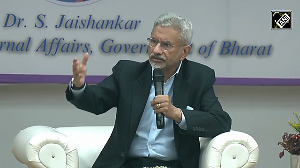UEFA's executive committee will discuss the precise definition of own goals on Friday in an issue of huge importance to Europe's top strikers and defenders.
European soccer's governing body is keen to end confusion over whether a goal should be credited to an attacking player, even when it has been diverted into the net by a member of the defending team.
"It wasn't something that was seen as particularly important 20 years ago," UEFA spokesman William Gaillard said before the meeting in Liechtenstein. "But now, for the player's careers and so on, it seems that it is."
Gaillard said it is currently left to referees to identify goal scorers in their match reports but that had led to discrepancies in the past.
"There is no real rule right now for what constitutes an own goal and that's the problem we want to look at," he said.
"In some cases a referee's decision has been overturned, usually with some UEFA people looking at a video in a very informal manner. But we want to have the whole thing codified to clear up any ambiguities."
A number of weightier subjects will also be up for discussion on Friday, including UEFA's efforts to secure concessions from the European Union in regard to sport's specific nature within EU law.
Along with world soccer's governing body FIFA, UEFA are calling for some form of national quota system to be allowed in domestic leagues, with limits based either upon players' nationalities or on where they received their youth training.
Although apparently in conflict with EU regulations on the free movement of European workers, the sports bodies have argued that a perceived excess of foreign players in leagues such as the English Premiership is damaging clubs' traditional identities.
The executive committee is also set to discuss Albania's suspension from international competition following FIFA allegations of government interference in the running of the national association.
On Friday UEFA will also select the venues for the Champions League and UEFA Cup finals for 2010 and 2011.
Germany and Spain each have two stadiums bidding for the Champions League finals, with Berlin's Olympiastadion and Munich's Allianz Arena up against the Bernabeu in Madrid and Valencia's Mestalla.
England's new Wembley stadium is the fifth ground in contention for one of the two finals.
London is also in the running for one of the UEFA Cup finals, with Arsenal's Emirates stadium facing competition from Barcelona, Hamburg, Dublin, Bucharest and Gelsenkirchen.







 © 2025
© 2025